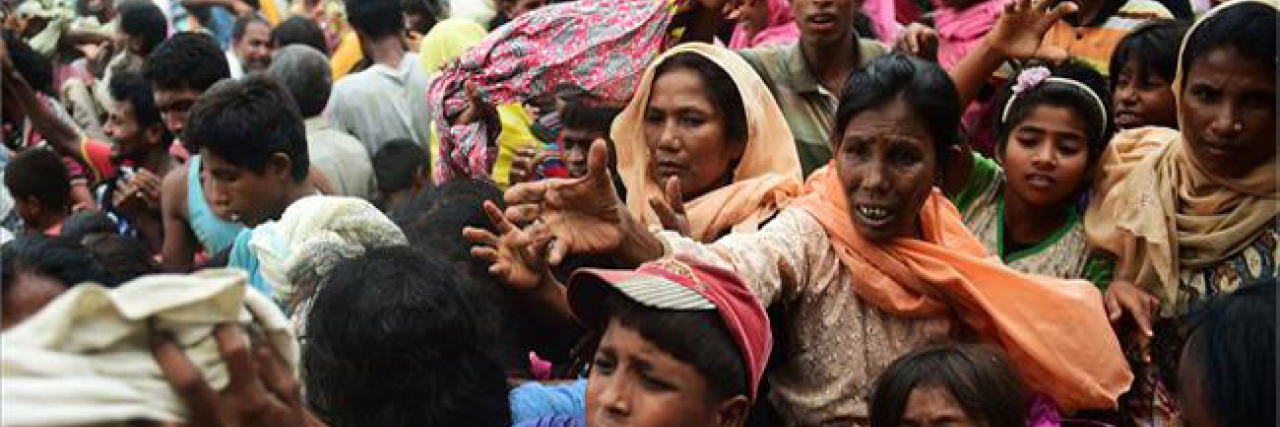March 5, 2018
By Dylan Adelman
Since 2012, the Rohingya of Myanmar’s Rakhine State have suffered one of the world’s most pressing humanitarian crises. A violent crackdown on this predominantly Muslim minority group has produced chilling reports of human rights abuses carried out by Myanmar’s security forces. An estimated 830,000 people have been pushed across the border to Bangladesh over the last year alone. Yet despite mounting evidence of military atrocities perpetrated against Rohingya civilians, Burmese officials refuse to acknowledge, much less take responsibility for, crimes against humanity.
2017 saw a rapid and alarming escalation of the crisis. In September, the UN High Commissioner for Human Rights called the military’s actions “a textbook example of ethnic cleansing.” In October 2017, Rohingya fled in even greater numbers, with 10,000 entering Bangladesh in a single day. In November, AJC joined 58 other NGOs in calling for targeted sanctions against Burmese officials. In December, the United States, which until recently has pushed for closer ties to the young democracy, levied sanctions against a top Burmese general, but more pressure needs to be exerted to effect change.
The international community stands at a critical juncture. It must ask: How can we best end the grave and violent human rights abuses against the Rohingya and prevent their recurrence, punish those responsible for the crimes committed, and assist the reintegration of the Rohingya refugees back in their homeland?
First and foremost, we must end the violence; any further discussion about the return and reintegration of the Rohingya can only be premised on guarantees of their safety and security. We must also recognize that their return and their place as a minority community within Myanmar is quite complex, and requires an equally complex and multipronged approach. While the mass rapes, murders, and torching of villages on a massive scale may be relatively new, the ethnic conflict, fueled by competition between the Rohingya Muslim minority and the Buddhist majority, leading to the non-status of the Rohingya in Myanmar, has been brewing for decades. It will not be solved by external imposition, but must rather be crafted and implemented fully by the Burmese government.
On multiple occasions, including during an official visit to Myanmar in 2016 to meet with the country’s top leadership, AJC has called on the Burmese military to stop the violence and allow independent human rights investigators and journalists unimpeded access to Rakhine State. This is, at the very least, a first step that can lead to transparency and justice. At the same time, AJC continues to engage with government representatives both in the United States and in Myanmar and maintain an open, receptive line of communication. At present, Myanmar’s authorities have the most power to resolve the crisis, and therefore engagement with reasonable voices representing the country is essential. Pressure by the international community coupled with diplomacy provide the path forward.
The Burmese government voices its own concerns about insurgent groups such as the Arakan Rohingya Solidarity Organization (ARSA), which attacked border-guard posts in 2016 and killed nine soldiers. While the government’s military response has been extreme, even criminal, we need to hear and understand the reasoning behind the escalation in state-sponsored violence. Without understanding the motivation—even if one rejects it—resolution will likely prove impossible.
Although outsiders’ access to Rakhine has been barred, satellite imagery and first-hand accounts from refugees give some idea of the grave situation on the ground. Reports of rape, public executions, and scorched-earth policies are confirmed by other sources. The Burmese government does not have the credibility to claim it can conduct investigations. Therefore, these must take place under an international umbrella with the cooperation of the Burmese government, and there must be steps in place to prosecute those deemed responsible.
The Burmese military’s attempted cover-ups have proved futile. The steady leak of insider information and the mounting tangible evidence of crimes have only stoked the international community’s resolve.
Concerned countries must unite in withholding arms to Myanmar’s security forces. Nations such as Israel have already taken steps in this direction, but additional action from the UN Security Council is warranted.
In 2017, the UN raised $344 million to fund relief programs in Myanmar – $90 million short of the requested amount. What’s more, the UN Emergency Relief Coordinator has declared that required aid funding will be even higher in 2018. As other pressing global challenges vie for support, we have a responsibility to make sure the situation in the Rakhine State remains at the forefront of international concern. Additional funding, ramped up awareness campaigns, and further reports on human rights abuses will be critical in assisting refugees and combating misinformation from Burmese authorities.
The exodus of the Rohingya refugees is the most rapid mass population movement since the Rwandan genocide of the 1990s, and swift, comprehensive action is required. AJC will continue to participate in this conversation, and we will express our deep concern and condemnation of acts that threaten the lives and well-being of the Rohingya and any other minority community. We hope that those in power in Myanmar will hear the voice of reason and bring an end to this atrocity.
Dylan Adelman is Senior Program Associate at the AJC Asia Pacific Institute.


